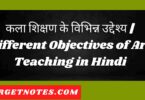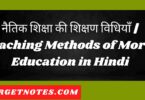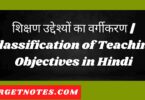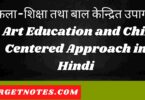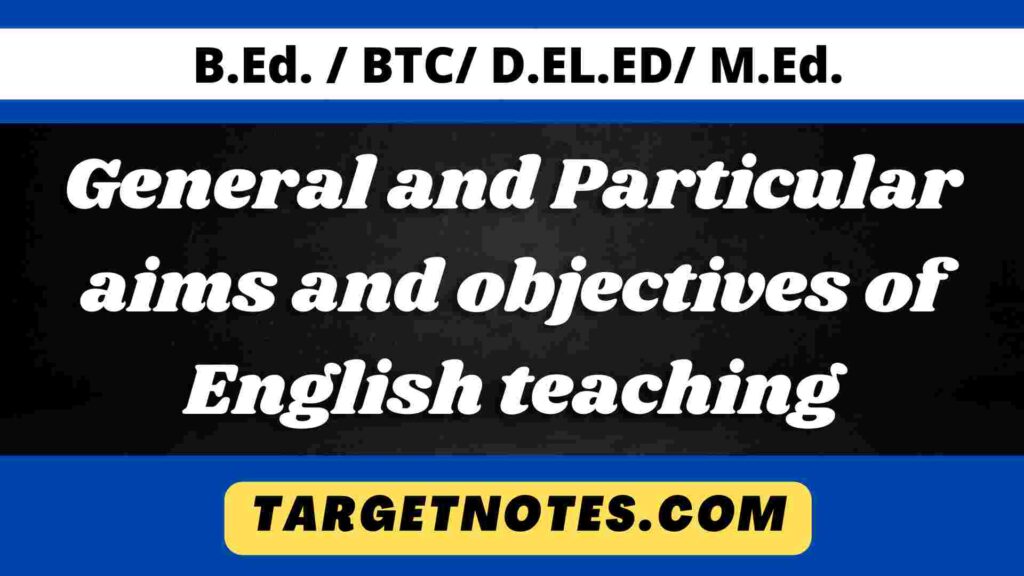
Describe the General and Particular aims and objectives of English teaching.
For all practical purposes of teaching it is of vital significance to know clearly the aims of teaching a subject. Without a study of these aims, a teacher, cannot hope to achieve anything. His teaching, without pre-conceived aim will be like the journey of a passenger who does not know where he wants to go. Thus, he is first required to fix up his ‘destination’-the ‘e d’ i the beginning, before he actually con ne ces his journey. What preparations should he make for his journey? Which ticket should he buy which means of transport should he choose for his journey etc. ? These and the like are questions which will receive their appropriate answers only when he has fixed up the end’ and purpose of his journey in the beginning. Teaching can safely be likened to an “architectural conception of work” where an artist ‘foresees the end in the beginning and never loses sight of it.” It is a creative art. He begins with his work only when he has drawn a clear and complete picture of his constructional work. His first attempt and then all the successive ones justify the ‘end’ and the ‘end’ justifies the beginning and all his attempts. It is so because he has remained conscious of his ‘end’. While taking each step, he never lost sight of it. Therefore, a aim should usually be decided upon where beginning to prepare a lesson, so that it may help in the planning and execution of the plan.
For our convenience we may divide the aim of teaching English into: (a) General Aims (b) Particular or Specific Aims. The general aims are long term aims of English teaching. They are at par with the aims of education. So, these are meant to be achieved during the schooling period of the pupils. As English begins from the VI class and continues study upto XII class, therefore these aims are to be well spread from VI-XII school period. On the other hand, particular or specific aims are the ‘objectives’, which the teacher aims to achieve in his day to day teaching.
General Aims: The study of a language has four aspects, viz., the Semantic aspect, the Phonetic aspect, the Graphic aspect and the Phonetic-cum-graphic aspect.
The Semantic aspect means the understanding of the meaning. This means meanings of the words and their relationship used in a sentence. It deals with ‘comprehension’. The Phonetic aspect is the sound aspect and deals with the spelling and pronunciation of words. The Graphic aspect, is the writing aspect and deals with the written form of a language. The phonetic-cum-graphic aspect means the reading aspect. To these four aspects, some add two more: (1) the literary aspect which leads to ornamentation of a language, and (2) the linguistic aspect which means the working knowledge of language. As has already been referred to in the first chapter, all these aspects of language work in co-ordination with each other and none of these can work in isolation. I have also mentioned that all these aspects work with understanding at their basis. Hence, there are four general aims :
- To help them acquire proficiency in speaking English.
- To enable them to write English.
- To enable the pupils to hear and understand spoken English.
- cable them to understand what they read in English.
“In short, to understand the spoken and the written language and to speak and write it may be the general aims of English teaching. With these aims, the task of an English teacher as train the hearing, reading, speaking and writing abilities of his pupils with understanding as the main ingredient in each.” This is the linguistic aim of teaching English. Thon pso and wyatt go a step forward and say, “It is necessary that the Indian pupil should not only understand English when it is spoken or written, but also that he should himself be able to speak and write This is the practical side of these aims. A practical command of language has been stated to be the purpose of 10th instruction in English, as judged by the ability to write in good modern English on any simple topic without previous preparation. Therefore, at the high school or higher secondary stage where English is to be taught as a second language, we should be contented with its linguistic aims. Our chief concern should not be about the difficulties of pronunciation, growth of vocabulary, grammar and structure, but with language abilities.” Accordingly, the teacher’s first concern is to get the pupils’ language abilities into action. The learning of a language goes with this activity. This fact should be the guiding principle in devising our methods, plan of work and selection of schemes for the language teaching in each class throughout the school. Palmer is of opinion that the literary aim should not be followed at the school stage. Teachers should aim at the linguistic aims only. “To aim at literature is to miss the way to language. To aim at language is to pave the way to literature.” It seems sound enough that unless pupils are grounded in language they cannot be at home in its literature.
When all this is said about the linguistic aims of teaching English, we need to think for a while that during the five or six years of schooling, a teacher is to concentrate upon training the facilities of his students in hearing, reading, speaking and writing only. A well-organised programme to develop these abilities should be followed.
Another opinion is that the linguistic aspect developed in these five-six years of learning at he cost of other abilities, may tell upon the other aspects of learning English. As such, we may advance the cause of Literary aims also. This is true, Literature disciplines the mind of young children. They feel joy in reading it. It develops expression in them. Therefore, the study of literature cannot be postponed for indefinite period. But all this is possible when they are well upto the mark in language.
At least in the first three years the study of English as language must be followed. In the later years, however, we may lead our pupils to expression or ‘reproduction’. For this, some excellent pieces of simple English prose and some easier poems may be selected. These again, are to be supplemented by some Extensive Readers. “These will have to be studied not from the point of view of pseudo-critical enquiry but of imaginative and logical comprehension, of textual analysis.” According to Mr. V. K. Gokak, “Language teaching is not such an unpleasant task as it is imagined to be. With proper training and equipment it can even be delightful.” Mr. V. K. Gokak suggests the study of “regional literature” which is growing up all around us. This will help the shaping of their minds. Therefore, the study of regional literature should be included in their courses of study. The regional literature may be translated into simple English for their ‘revitalisation’. In this way, the study of literature will be continued and our pupils will not be facing any difficulty in studying literature.
The teacher will bear in mind that his main objective is to develop four linguistic skills. In his planning he will aim at teaching new words and will help his pupils in building up a varied and well-balanced vocabulary. In order that his pupils may form correct linguistic habits, he will teach them new grammatical forms, usages, constructions and patterns. The teacher will not omit the written aspect of the language. All these “elements of language” must be taught with an ‘expression’ aim also. Whatever the pupils have learnt in their oral exercise or in reading lessons they require it practice in writing also. In the earlier stages, the writing will follow their oral learning. Words and sentence patterns, practice in grammatical forms and use of words in their proper context should be followed. Later on, he “must also aim to teach his pupils, write passages of a page or so of clear, well-connected thought in correct language with every point relevant to the topic they are writing about.”
Specific or Particular Aims: Besides the general aims of teaching English, the teacher should have definite, clear-cut aims for each lesson. In other words, these are “objectives” of teaching the content of each lesson. Thus, they are short-term aims. They should be clear, precise pointed and expressive in terms of achievement. These specific aims will vary according to his “teaching points”. It is very necessary for a teacher to specify his objectives of teaching. This helps him to know exactly what he is to do during a particular lesson e.g., a teacher desires to choose a lesson on grammar. The teacher selects Tense for teaching. Instead of having tense as his specific aim, he should select a ‘particular’ tense-say, Present Continuous Tense. So, the specific aim of teaching in an early lesson in Grammar will be The Teaching of verb in the Preset Continuous Tense’. His next step will be “to illustrate and use the Present Continuous Tense.” In order to achieve this limited objective the teacher should begin with the verbs which can be explained with the help of actions. ‘I am going’, ‘you are going’, ‘they are going’, I am coming’, ‘you are coming’, ‘they are coming’, I am sitting’, ‘you are sitting’. ‘I am standing at the table’, etc. He should speak and act himself and get the actions performed by his pupils. They should speak as they act.
The teacher’s next lesson on the same Tense may be: The general aim of his teaching will remain the same-To teach some grammar’. But his specific aim will be changed this time, even though his topic is the same. This time the teacher may aim at giving further practice in the Present Continuous Tense. Therefore, his specific aim will be “To illustrate the Present Continuous Tense and to have it well practiced.” Specific aim gives definiteness and makes teaching purposive. “This clear-cut definiteness of aim gives focus which enables the teacher to see exactly what his pupils have to do in the lesson and it helps the pupils to realise exactly what they have to master. It simplifies and focusses the preparation and implic a teacher and his class to concentrate on the topic to be learnt.”
A specific aim lays firm foundations of teacher’s success. Thus, the teacher must be very clear, sure and precise in selecting it. It must be one and one only. A singular, definite aim enables the teacher and the pupil to “concentrate on one aspect of the whole subject and on one language activity.” He should declare his specific aim to his pupils so that they may know in advance what they are going to learn in that period. This will fix their mind on that ‘specific aim and their energies will not be scattered. With a clear-cut specific aim both the teacher and the pupils stand on a firm road along which they can walk hand-in-hand, with confidence.
The above example, clearly illustrates my point. In a reading lesson, he must find it that his specific aim is ‘reading aloud’ or silent reading whether he aims at discussion in a conversation lesson or the discussion is to lead to composition. There may be various objectives in mind in a reading lesson e.g, the teacher may feel the necessity of improving the oral expression of the pupils or he may desire that his pupils are able to read fluently. The teacher may also feel that the defects persisting in the pronunciation of pupils must be removed. In such a reading lesson, these various specific aims may confront a teacher at the starting point. With a little care he will fix up his focus on ‘one’ and prepare his lesson. It will help him in selecting the required material for his lesson. It will help him to decide the kind of work his pupils should do on it. Whether the specific aim is to be achieved by chorus drill, or oral question and answer method, or written exercise, or reading aloud, is to be decided by the teacher. If he desires that his pupils should do work on Grammar, should first give them oral drill and next, sentence completion exercises. If his aims is to train his pupils in reading aloud fluently, he must give a model reading himself, which must be followed by their silent reading. One or two comprehension questions may be asked from the passage read. Then, reading aloud by the pupils will follow. In extensive reading, easy and interesting stories must be chosen first. Informative passages may be selected for improving their comprehension. In the teaching of Tense, questions must be framed which require answers containing that tense. This may, however, be carried on, by way of practice, i.e., oral drill, by narrating short and interesting stories or by, developing a situation with the help of material aid to be used in making these lessons interesting and illustrating. The questions must be framed in the same tense in which the teacher has aimed at teaching his class. In this way, it is the specific aim which enlightens the teacher to select his teaching activities as well as the activities of the pupils. In terms of educational technology we can say that the specification of objective is the motor that sets the teaching-learning process into motion.
Conclusion: “The technique of choosing a very limited objective of each lesson is the most fruitful aid to better teaching. It gives focus and so, concentration, it gives clarity and therefore, better understanding, it gives precision and thus, more firmly established progress. The careful thinking out of a detailed and well-defined objective for the lessons will do more than almost anything else to improve a teacher’s work and to make it effective. It will entitle him to enjoy the fruits of his labour. The pupils will take more interest in his teaching and will show signs of quicker progress. The teacher will have pleasure and satisfaction which will inspire him for further improvement.
Aims of English teaching at the Senior Stage: From IX class upto XII class is the senior stage of English teaching. At this stage, the aims of teaching English will be both linguistic and literary. The objectives of English teaching cannot be confined to mere training in hearing. reading, speaking and writing. By virtue of its own clarity and power of expression and by virtue of its getting hold on law, engineering, medicine, agriculture and other scientific and technological departments. English has won universal recognition, English is the language of trade and industry in our country and in other countries of the world as well. It is used, not only as a means of communication, but also as a vehicle of culture. The proceedings at the U.N.O. and other international institutions are carried on in English. In the light of growing internationalism we have also to play our own part and interpret our thought, enunciate our policies and communicate the message of peace, prosperity and co-existence to another nations. English possesses an imaginative literature which has few equals in the world. Its impact is far-reaching. We have to prepare our pupils to fit in these fast developing conditions.
To-day we cannot overlook and ignore the growing impact of science and technology on Indian society. Every day new discoveries are made. These discoveries are either. an advancement on the prevailing concepts or they totally refute the previous claims. Professor Hoyle and Dr. Narlikar’s new theory of gravitation presents totally altered concept of the theory of gravitation which Newton and Einstein had given us. France, England, West Germany, Russia, China and Japan are running at a fast speed towards opening, gaining and absorbing new science and new technology. For the development of Indian economy we will be needing more industrialisation which will need more technical and skilled men. These men must be equipped with the latest technical know-how. It is in this light that young men of India will always feel the necessity of acquiring proficiency in English which is a great reservoir of such knowledge. It requires the study of English literature as literature of knowledge and as applied literature. We require the acquisition and understanding of terms which interpret new theories and new practices in the field of technology. Not only translation of standard books into regional languages of India will serve our purpose but also there is need for original investigative formulations. The scientists of India, well-versed in their respective branches of study, have to equip themselves with a thorough knowledge of English and of their own languages, so that standard books in their own languages may be produced. India’s glorious past has always attracted attention of every sensible man. The growing impact of Westernization on Indians seems to lose its grip and scientists in India have begun to find the sources of some modern scientific inventions rooted in India’s past. Scientists need to expose their findings to the world. For this, a study of English is necessary. An intensive study of the English language in our schools and colleges can alone help us to enrich our applied literatures just as the study of English literature helped us to revitalise our creative literature in the recent past.” Let us suppose Late Prime Minister, Mr. Nehru, is reported to have said, “All regional languages must be developed and promoted. But that did not mean that English should be discarded. To do that will amount to closing a window on the technology… Foreign languages served as window on it and to suppose that translations could take their place was a mistake It was no use getting into an intellectual prison after achieving the political independence.”
In the light of this statement, we can say simply this much that English is the “key to comprehension of the world.” Let us not lose it for ever. Let us make best use. Let us also open the gates of this window for our younger generations so that they may, in their turn. Let it remain open for their sons and grandsons.
Creative thought in every department of knowledge is very active in the West. Traces of development have begun to appear in India but in very limited sphere. So long we come upto mark of the Western achievement and show ourselves at par, it is not only desirable but also necessary to maintain our constant contact with the West. Excelling them will be our next step. This requires a clear-cut policy along with a “will” to implement it. For this we will have to go back to Rabindra Nath Tagore who had preached a synthesis of the East and the West. We have to assimilate knowledge borrowed from various sources. We have also to show originality in our compositions. For achieving this ensure : Linguistic aims, i.e., proficiency in speaking reading, spelling and in writing correct English. Expansion of thought and experience with a corresponding expansion of vocabulary for expression. Literary aims may be: Taking delight in reading, talking about and writing about singing poems, literary themes, poetry and acting plays, critical appreciation of posts dramatists, authors, emotional development with corresponding expansion of vocabulary for expressing the joy and delight enjoyed by such reading, or enacting scenes and dialogues for better and clear understanding, lastly, to attempt to write something original. With these aims in view, we have found it that the aims of teaching English at the senior stage will be both linguistic and literary. These aims will also help us in devising methods of studying English and selecting material for studies, number of periods, division of work, planning and teaching English, etc.
Contents
OBJECTIVES OF TEACHING ENGLISH
The Behavioural Psychology lays emphasis on the behaviour of human beings. With the growing influences of Technology in our life and education, more and more emphasis is now being laid on bringing out the ‘desired change in the behaviour of our students. The aim of all educational, academic and non-academic, activities is to bring about this required change in their behaviour. What is this “required” or “desired” change ? This has to be motivated by fixing ‘objectives’. ‘Objectives’ are, therefore, goals of teaching while the aims are the ‘aims of life and education. The former are short-term goals meant to be achieved in every teaching period while the later ones, as has already been said, are long-term ones’ meant to be achieved during the entire period of their education. The former are goals of teaching, the later are goals of education. ‘Objectives’ are more practical, more precise and more pointed. In short, these are action-oriented’ both from the teachers as well as from the pupils point of view. They are “guides” to the teacher. The teacher has to provide specific detail about these objectives to construct the design of his teaching and evaluating. If objectives achieved are perceptible in the behaviour of the pupils e.g., a teacher finds faults with his pupils when they speak, read and write. These are linguistic skills.
In order to remove the defects of speech and reading the teacher designs a regular practice to be given the pupils. After some time he checks whether the defects have been removed or not. In case the pupils are able to speak and read as the teacher had wanted them to speak and read, the teacher will be satisfied with the ‘changed’ behaviour of his pupils. In case the teacher feels that his pupils have not given a satisfactory change of behaviour, he will either continue to give them more practice, or change the process of his teaching to bring out the required change of behaviour.
Dr. B. S. Bloom has provided a list of educational objectives, bearing in mind that change in behaviour occurs at the Cognitive, Affective and Psychomotor domains.
Each class-room activity has to fall under one or the other domain mentioned above. The wise teacher has to specify the classification and himself define his ‘objective’ followed by its activity, write the objective it terms of learning behaviour, clearly specify teacher’s and the pupil’s activities, the devices used and finally, evaluate whether his ‘objectives’ have been achieved or not. In case evaluation does not provide encouraging result the teacher has to see where he or his pupils failed and what changes in his teaching process are required to produce satisfaction result.
Plan of Teaching and Courses of Study (The University Stage)
We have seen that the linguistic and literary aims are inseparable at the Senior and University stages. The aims at University stage are expression in oral and written forms and comprehension of the written or oral material. The Secondary Education Commission, the Kunzru Committee and the Seminar on the Teaching of English convened by the University Grants Commission have emphasised on these objectives. They held that the study of English will help our pupils to comprehend other subjects also. The libraries in the Universities abound in books by English authors on all subjects. Our pupils have to supplement their knowledge by reading such authorities. Therefore, there is need of comprehending, reading and understanding these books. They also opined that the pre-university year is a crucial year. Hence, eight periods in a week should be allotted to English. Of these, four should be devoted to text and four to the cultivation of language skills.
There may be four texts. One should be for intensive study which adds to their active vocabulary. The other may contain passages on physical or social science. The third book may be meant for non-detailed study, for example, a book on one-act play, a collection of short stories or a short unabridged novel. This will help in developing their passive vocabulary. The fourth book may be collection of lyrics, short and easier poems. The guiding principle in the selection of these texts should be the range of the pupils’ experience and their interest.
The seminar on the teaching of English held the view that no single book on grammar should be followed by a teacher. The teacher should select his own and use his freedom of choice. The language skills, to be achieved are:
1. The Mechanics of Expression- Consisting of sentence patterns, spelling and punctuation.
2. Vocabulary- Word groups, synonyms and antonyms.
3. Comprehension – Unseen passages in prose or verse. Questions may be based on these passages and pupils may be expected to reply to them. They may be expected to write a precis of the given passage.
4. Composition- Essay of about 300-400 words or a letter or a dialogue or story may be developed from a given outline.
The expression aim implies “effective expression”. It means that pupils are to learn appropriate sentence-patterns and words as the topic demands and also that they can use and appreciate proper idioms, figures of speech or a decorated language. Therefore, in their tutorial periods such exercises should be given to them from their text-books.
5. Spoken English- Training in spoken language is quite essential. They should know the multi-syllabic nature of English words. They should also know the significance of word stress.
They should be given practice in international phonetics and phonetic script. Opportunities should be offered for conversation. Day-to-day affairs and experiences may form the topic of their conversation. Debates and dialogues, one-act plays may be organised from time to time which offer opportunities for spoken English. The college may hold an oral test at the end of the year.
Secondary Stage: The matriculates are supposed to have learnt nearly two thousands five hundred and two hundred fifty structures by the time they complete their studies at High School. Observations show that pupils fall short even of this standard. They do not master more than thousand words. They cannot write or express themselves in simple sentences. To make for this deficiency, remedial courses’ may be organised either during the summer vacation preceding the pre-University year or a special intensive course during the first few weeks of the pre-University. This practice may continue as long as the contents of the remedial course are absorbed in a graded manner in the Higher Secondary Course and it forms the integral part of the Higher Secondary Course.
The unhappy state at the University stage is too much of lecturing and a huge class where no other method is practicable. The result is obvious. The pupils lose the advantage of their teachers’ personal contact and become passive learners. The teachers, on their part, seldom recognise the difficulties of their pupils. Therefore, the emphasis should be laid on tutorial work, where the teachers may pay attention to the problems of their pupils and the pupils may get opportunities of establishing personal contact with their teachers. The lecture period should be utilised for “imparting fresh information either with regard to language or to the textual materials. Reading of texts from line to line should be avoided. Methods of study should be demonstrated in the class with the reading of few pages from the text-book. The text should be divided into home assignments and in their tutorial period. Questions should be asked of the students. Necessary discussions on the topic may be allowed in the tutorials. Their difficulties should be properly attended to by the teacher. It would be quite helpful if the teacher seeks co-operation of students in solving difficulties of some students or in discussing a particular topic. The tutorial period should be really a discussion and question and answer class and not merely a period in which students write composition exercise on set themes.”
Besides this, the Annual or the Public Examinations conducted by Indian Universities are not based on the objectives of the courses. Question papers also fall short of these objectives. They simply reflect the number of text-books. Traditional pattern which lays emphasis on ‘cramming up’ is followed and leaves no room for flexibility. We should drastically revise our procedures and remember that an examination is the measurement of a living achievement, not merely a stock-taking of dead crumbs of knowledge. Therefore, the necessity of reforming our examination system. New technique based on ‘objectives of the courses may be adopted.
A compulsory course in English in a University where 3 years’ course is followed has been reduced to two years and in some, to one year. There are Universities which do not feel the necessity of English teaching for science and commerce students. They either believe that English is a language which is intimately connected with its literature and the study of language and literature is not required by students of science. It is interesting to note that these universities have also begun to realise the significance of teaching English to science students. Comprehension and expression should be aimed at, even with the students of science and commerce. It must be borne in mind that these aims cannot be attained in a year. They require a patient and constant practice. What is needed is a reorientation of the courses so as to suit the acute needs of the living in modern times of “explosion of knowledge.”
Thus, the aim of such course can be the ability to read and understand any modern English writing. Provision should be made in their text-books of pre-professional year, to introduce them to special vocabulary used in medical science, agriculture, engineering, etc. The pupils should also be able to understand the spoken English during their lecture. They should also be able to express themselves, in speech and writing on various topics.
On the literary side, literary comprehension and expression will be the aims. For this the study of English classes is suggested.
So far, we have been considering about the pre-University year, the crucial year, as it is supposed to be. The same pattern with the same objectives, same methods, same distribution of work, may be followed in the second year also.
In the third year, “the course unit in language skills should continue with two periods a week”. They should also be given some practice in translation, precis writing and essay writing. This will help in improving their expression. Practice in pronunciation with word stress should also be given.
Translation is of vital importance as an exercise in the, achievement of literary aims. If we desire that our regional languages should be rich enough and that these languages should serve as media of instruction, we should translate standard material from English and other languages into these languages. Students offering Optional Courses or special courses in English should translate regional literature into English. Students of Chemistry, Physics, Botany, Zoology, Philosophy, Economics and other disciplines should be trained in translating English writings on these subjects into their own languages.
For the elegance and grace of style in writing, optional course in English may be remodelled. Optional course plus compulsory English have to offer opportunities to science students and students of technology. The literary material to be included in optional courses should be chosen from the modern authors and poets. To achieve grace and elegance, students offering optional English should know something of theory of style and principles of literary criticism. They should also know something on phonetics and get training in the intonation and stress patterns of English speech.
Therefore, the objectives will be:
1. To acquaint them with modern European classic through English classics. Emphasis should be laid on the stylistic aspects of these works and the tests will concentrate on these details.
2. To enable them to master the finer graces of spoken English, such as, intonation and the stress patterns of English speech, i.e., learning, the technique of the language-the mechanics of speaking, reading and writing it.
3. To acquaint them with modern literary classics in English.
4. To make them capable of translating standard Indian work on their subject into English. In this way, Indian thought on that subject will be presented in powerful and graceful language.
Aims of Teaching Literature (High/Higher Secondary Stage)
In the foregoing pages, we contended that English is to be treated as a second language. We also observed that the aims of teaching English at this stage should be linguistic and not literary.
This, however, does not rule out the significance of the teaching of some literature to the young pupils. If we say that the process of teaching literature should begin even in the earlier years, it may appear wrong and just the reverse of what we have been laying stress upon by now. This is not true.
The aims of teaching literature are :
- To acquaint them with literary persons, their work, their thoughts and experiences and thus realise their own.
- To enable them to select and appreciate beautiful lines and the ideas they contain from prose, poetry or whatever they read.
- To enable the pupils to enjoy wider thoughts and the emotional pleasures of other human beings.
- To develop critical thinking and spirit of enquiry.
- To create standards of taste for certain things that are worthwhile.
In the earliest class of English in Indian schools, the first aim we mentioned above, seems to be difficult to achieve. But if we treat it sympathetically, we can do a bit of it. Well, we may choose some poems within the range and experience of our children. These poems should be easy and it is better if their theme is ‘flower’, ‘boat’, ‘bird’, ‘rainbow’, ‘cloud’, ‘rain’, etc. These are familiar subjects and stanzas of four to six lines can be read out to the class with comparative ease. The reading of the poem is quite important. We cannot aim at rhythmic reading but our reading should also not be prosaic. The teacher may take the help of illustrative aids in creating an atmosphere and taste for such reading. The poems or the reading material may be selected, the idea of which our pupils have already got in their mother-tongue. We may not concentrate upon the emotional appeal in their first year. A beginning may, however, be made with nursery rhymes. The thought content which we desire our pupils to understand, may be followed by way of illustrations, comparison and contrasting. The children may be initiated in reading magazines and collecting pictures, lines of poems from their own Magazines, etc.
In their 4th, 5th and 6th years, the teacher should attempt to acquaint his pupils with authors and poets. Here too, he may refer to the authors and poets that the children have read in their mother-tongue or in previous years and try to find out points of similarity and distinction. In teaching poetry, at this stage, the teacher’s reading is required to be more developed. More attention is to be paid on the ‘niceties of rhythm and language’. Exercises which may help to cultivate a sense of rhythm and rhyme may be introduced.
Pupils should be offered plenty of opportunities for hearing. A teacher ought to read to his class. All things that the pupils may like to appreciate, should be read to them. Reading aloud is quite significant. It has its own aesthetic value: “When the child can give expression to fine sounds, standing for worthy and beautiful ideas. … The emotional value, the force which moves us when we contemplate or produce or try to produce something beautiful becomes greater in good literature, especially in poetry, when it is suitably read aloud.”
It will help them a lot. They will be trained in reciting poems effectively. They will be able to appreciate the sounds. The teacher may himself learn much of attractive reading from the gramophones and also play them in his class.
A short discussion, questioning and answering, may be followed and teacher may, to his own convenience, allow his young friends to take part in such discussions. Short scenes from their mother-tongue text may be selected and demonstrated in the class or at the school functions. He may also translate such conversations or dialogues are interesting and within the range of their experience, into their mother-tongue and these may be rehearsed in the class. Gradually, when he is confident that such a taste has been created in them and that with little practice in correct pronunciation, his pupils can give a better performances, these may be demonstrated in English also.
In the same way, narration of short stories, an account of interesting journey, adventures, incidents, etc., may first be carried on in their mother-tongue and later on in English. The objective of such a literary training is to sow seeds of an all-round education “helping the young pupils for their harmonious development.” They will be helped to create in themselves standards of taste. A beginning of a process of life long enjoyment will be made. Not only this, those who advance to take up their University education will not face difficulties. A direct bond between their secondary stage and the University will be created.
IMPORTANT LINK
- The Natural of Direct Method of English Teaching
- Advantages and Limitation of Direct Method
- New method of English teaching
- Methods of English Teaching | The Translation-cum-Grammar Method | Merits and Demerits of the Method
- General and Particular aims and objectives of English teaching

